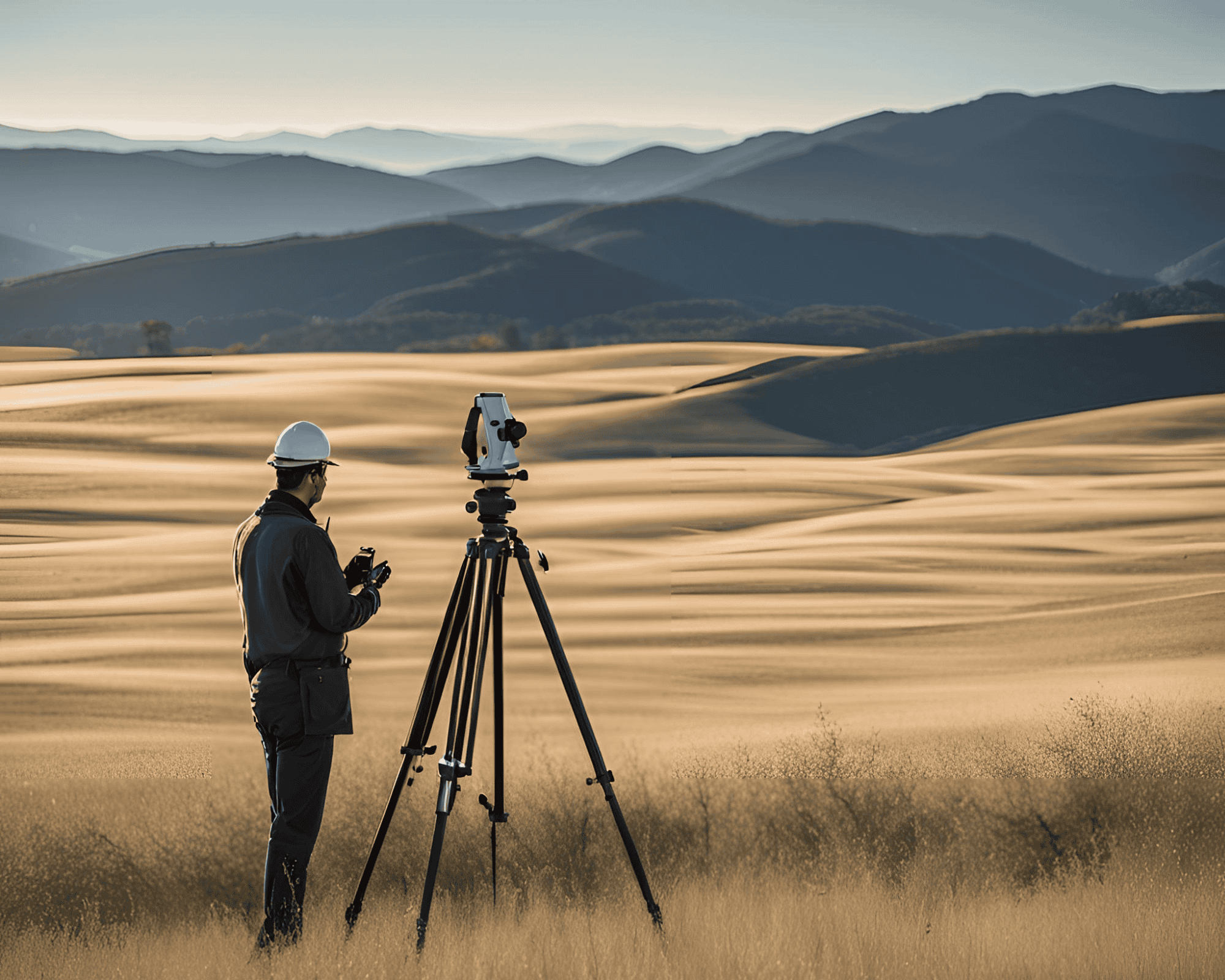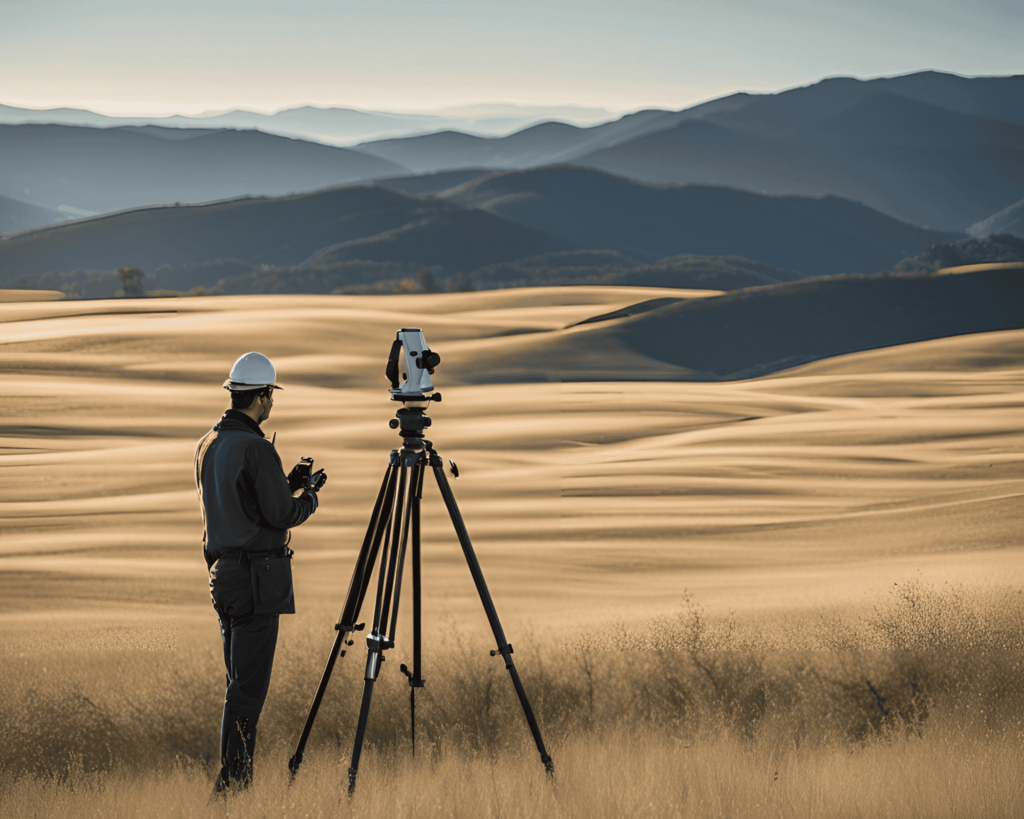Land Surveys: A Guide to Understanding Types and Terms

Thinking about buying property? Or maybe you’re planning to build something new on your existing land. This is where a land survey comes into play. It’s more than just lines on a map; a land survey gives you the confidence to move forward with these big decisions.

Table of Contents:
- What Exactly is a Land Survey?
- Why Would You Need a Land Survey?
- Types of Land Surveys: It’s Not One-Size-Fits-All
- Finding a Land Surveyor: How Do You Choose?
- Conclusion
- FAQs about land survey
What Exactly is a Land Survey?
At its core, a land survey is a detailed report that draws outlining your property’s exact boundaries and features. It is like getting a blueprint to your own piece of the world. But don’t underestimate its complexity – it requires a keen eye and professional skill to deliver an accurate survey.
This is where professional land surveyors come in; they are trained and certified to map out every detail. This specialized profession utilizes law, math, and fieldwork to determine precise property lines. Surveying land ensures that you accurately represent your property for various purposes, including legal, construction, or real estate transactions.
Why Would You Need a Land Survey?
Many people think land surveys are just for buying or selling property. And yes, if you are unsure of the property lines, a land survey is a good idea when buying a home.
If you are financing, a lender will likely require a mortgage survey to ensure no surprises about the property boundaries. This protects their investment and yours, too. However, other situations exist where a land survey can really save the day.
Resolving Boundary Disputes
Have you ever talked awkwardly with your neighbor about who owns that tree? Or where one neighbor is supposed to mow or stop mowing? A land survey provides a clear picture for everyone involved and is your solution to preventing and solving disagreements. Property owners often rely on public records, such as recorded deeds and plat maps, to understand their property boundaries. Still, these records might not always reflect the current reality of the situation.
Planning a Construction Project
Imagine accidentally building on your neighbor’s land because you were off by a few feet. That’s not ideal. A land survey ensures that your new shed, fence, or even your dream home stays within your property lines and adheres to local zoning codes.
Installing Utilities
You’ll want a land survey before you dig up your yard for that new water line, propane tank, or septic system. A land survey locates those unseen utility lines, avoiding costly and potentially dangerous accidents. Knowing the location of these easements is essential to avoid legal issues and ensure the proper functioning of utility services. Safety is best when it comes first.
Dividing Land or Combining Parcels
Maybe you’re passing down a legacy to your kids or consolidating lots. Either way, a land survey ensures that splitting or combining is done accurately, avoiding complications. With a land survey at its core, this careful approach guarantees smooth transitions for these critical life events.
Types of Land Surveys: It’s Not One-Size-Fits-All
Just like different types of houses, various land surveys exist, each serving a specific purpose. Knowing which one you need to get the job done right is essential. Whether you’re buying a property, resolving boundary issues, or undertaking a construction project, understanding the different land survey types available is crucial to making informed decisions.
Boundary Survey: The Most Common Choice
The most basic and often requested survey is the boundary survey. This type of survey marks the corners of your land, using your property deed and existing markers as guides. It simply tells you where your property begins and ends.
The cost of a simple boundary survey typically ranges between $300 to $1000 but keep in mind prices can be affected by a multitude of factors so always double-check. A boundary survey is typically required to confirm the property lines when you’re buying, selling, or refinancing a property.
ALTA Survey: The Title Company’s Go-To
HAve you ever received a title commitment and seem the acronym ALTA on the page? It stands for American Land Title Association and is often required for commercial properties or if you need title insurance. This land survey dives deeper, checking for easements, encroachments, and even zoning regulations that a typical boundary survey might miss.
This is important because it provides everyone with a more thorough understanding of the land before any money changes hands. In addition to boundary information, an ALTA survey includes the surveyor’s certification, a legal description of the property, and any observed easements or encroachments.
Topographic Survey: Understanding the Lay of the Land
This isn’t your average land survey. The topographic survey is all about the physical features, think elevation changes, streams, trees, even man-made structures. This survey is crucial for anyone planning any construction, especially when building permits are involved. It gives a more comprehensive understanding of the land.
Topographic surveys are particularly important in areas with varying terrain, as they help identify potential challenges and inform the design and planning phases of construction projects. Topographic surveys depict the property’s contour lines, which indicate the elevation changes and help identify high and low points.
As-Built Survey: Ensuring Everything’s As Planned
This survey isn’t about where to build, it’s about what was already built. Also known as “record drawings,” the as-built survey verifies that a construction project was completed according to those original plans. It’s essential for maintaining accurate records for your property.
Think of it like a final inspection to confirm every wall and pipe is precisely where it should be based on those approved blueprints. It’s like giving your contractor a friendly “check-up” before you finalize the project. As-built surveys are crucial for future renovations, expansions, or legal purposes, as they provide an accurate representation of the property as it stands.
Finding a Land Surveyor: How Do You Choose?
Don’t just pick a name out of a hat when hiring someone for a land survey. Find a qualified, licensed surveyor in your state. You can easily check their credentials by searching their licensing board. The cost of hiring a professional for your land survey might surprise you. You can also ask a local, experienced real estate agent you trust, as they are likely to have come across multiple surveyors in the area and can give you some names.
On average, you can expect to pay around $1000. However, the actual cost might be higher or lower, depending on factors like your land size and the surveyor’s work. When selecting a surveyor, consider their experience, reputation, and whether they carry professional liability insurance.
Conclusion
Taking those first steps toward buying property, resolving a boundary dispute, or starting a construction project, a land survey can give you peace of mind. By knowing the ins and outs of your land, you’ll be well-prepared to make informed decisions about what truly matters – your property. Want to learn more about purchasing land? Check out this article.







